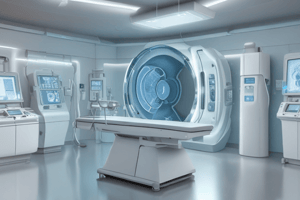Podcast
Questions and Answers
What is the main focus of the field of medical physics?
What is the main focus of the field of medical physics?
- The diagnosis and treatment of disease using physical means
- The application of medicine to the function of human body
- The application of physics to the function of human body in health and disease (correct)
- The development of atomic bombs
What is physical medicine?
What is physical medicine?
- The treatment of disease using radiation
- The branch of medicine that deals with the diagnosis and treatment of disease by means of physical agents (correct)
- The application of physics in the practice of medicine
- The use of computers in medicine
What is health physics?
What is health physics?
- The use of computers in medicine
- Radiation protection of patients, workers, and the general public (correct)
- The treatment of disease using radiation
- The application of physics to radiological problems
What is medical electronics (medical engineering)?
What is medical electronics (medical engineering)?
What is the term for the application of physics in the practice of medicine?
What is the term for the application of physics in the practice of medicine?
What is the branch of medicine that deals with the diagnosis and treatment of disease and injury by means of physical agents?
What is the branch of medicine that deals with the diagnosis and treatment of disease and injury by means of physical agents?
What is physical therapy?
What is physical therapy?
Which of the following is NOT a subdivision of medical physics?
Which of the following is NOT a subdivision of medical physics?
What is the term used to replace 'medical' when referring to a job closely connected with patient problems in hospitals?
What is the term used to replace 'medical' when referring to a job closely connected with patient problems in hospitals?
Which of the following is an example of a diagnostic technique in medical physics?
Which of the following is an example of a diagnostic technique in medical physics?
What is the main characteristic of science that is closely related to the growth of medicine?
What is the main characteristic of science that is closely related to the growth of medicine?
Which of the following is an example of a physical measurement involving the body and time?
Which of the following is an example of a physical measurement involving the body and time?
What is the term used to describe the measurement of quantities of chemical interest in medicine?
What is the term used to describe the measurement of quantities of chemical interest in medicine?
Which of the following is NOT an example of a therapy technique in medical physics?
Which of the following is NOT an example of a therapy technique in medical physics?
What is the term used to describe the measurement of the volume of the body or organs?
What is the term used to describe the measurement of the volume of the body or organs?
Which of the following is an example of a patient monitoring technique in medical physics?
Which of the following is an example of a patient monitoring technique in medical physics?
What is the approximate breathing rate of a human?
What is the approximate breathing rate of a human?
What is the duration of the action potential of a nerve cell?
What is the duration of the action potential of a nerve cell?
What is the formula for the gravitational force according to Newton's law?
What is the formula for the gravitational force according to Newton's law?
What is the effect of gravitational force on the venous blood in the legs?
What is the effect of gravitational force on the venous blood in the legs?
What is the result of the valves in varicose veins not working properly?
What is the result of the valves in varicose veins not working properly?
What is the location where varicose veins are most common?
What is the location where varicose veins are most common?
What is the force that involves attractive and repulsive forces between static electrical charges?
What is the force that involves attractive and repulsive forces between static electrical charges?
What is the term for the process of removing a foreign substance from the blood by the kidneys?
What is the term for the process of removing a foreign substance from the blood by the kidneys?
What is the force developed when a person's head stops in 0.5 cm in about 0.01 sec, assuming the mass of the head is 4 kg?
What is the force developed when a person's head stops in 0.5 cm in about 0.01 sec, assuming the mass of the head is 4 kg?
What is the coefficient of friction between two surfaces represented by?
What is the coefficient of friction between two surfaces represented by?
What is the direction of the frictional component of force Fv when the foot leaves the ground?
What is the direction of the frictional component of force Fv when the foot leaves the ground?
What is the formula to calculate the force developed when an object's momentum changes?
What is the formula to calculate the force developed when an object's momentum changes?
What is the normal component of force that exists on the heel when it strikes the ground?
What is the normal component of force that exists on the heel when it strikes the ground?
What is the force developed when a person's head stops in 0.5 cm in about 0.04 sec, assuming the mass of the head is 4 kg?
What is the force developed when a person's head stops in 0.5 cm in about 0.04 sec, assuming the mass of the head is 4 kg?
What is the primary role of the strong nuclear force?
What is the primary role of the strong nuclear force?
Which type of lever is least common in the body?
Which type of lever is least common in the body?
What is the formula for force in dynamic situations, according to Newton's second law?
What is the formula for force in dynamic situations, according to Newton's second law?
What is the direction of the weight in a second class lever?
What is the direction of the weight in a second class lever?
What is the result of the sum of forces in any direction in a static system?
What is the result of the sum of forces in any direction in a static system?
What is the term for the change in momentum over a short interval of time?
What is the term for the change in momentum over a short interval of time?
What is the force developed on impact when a person bumps into a wall?
What is the force developed on impact when a person bumps into a wall?
Which of the following is an example of a third class lever?
Which of the following is an example of a third class lever?
Flashcards are hidden until you start studying
Study Notes
Medical Physics
- Medical physics is the field that overlaps medicine and physics, involving the application of physics to the function of the human body in health and disease, as well as the practice of medicine.
- The field of medical physics has several subdivisions, including:
- Radiological physics: involves the application of physics to radiological problems, including the use of radiation in diagnosis and treatment.
- Health physics: involves radiation protection of patients, workers, and the general public.
- Medical electronics (medical engineering): deals with instruments used in monitoring body functions and diagnosis, as well as surgical aids.
- Applications of x-ray and ultrasound in medicine.
Medical Physics Techniques
- Diagnostic techniques:
- Tethoscope
- Manometer (blood pressure)
- Sphygmomanometer
- Electrocardiograph (ECG)
- Electroencephalograph (EEG)
- Electromyography (EMG)
- Thyroid function using I¹³¹
- Computer tomography (CT scan)
- Ultrasound
- Tuning fork
- Magnetic Resonance Imaging (MRI)
- Flow meter
- Spirometer (to study lung function)
- Audiometer
- Optics
- Laser
- Gamma camera (to study kidney, liver, and lung function)
- Therapy techniques:
- Radiotherapy
- High voltage
- Ultrasound
- Infrared
- Radio frequency
- Heating
- Laser
- Patient monitoring techniques:
- ECG
- Spirometer
- Blood pressure
- Thermometer
Measurement
- Measurement is a key characteristic of science, and its growth is closely related to the ability to measure quantities of interest.
- In medicine, early efforts to measure quantities of chemical interest were often scorned as detracting from the skill of the physician.
- Examples of common measurements in medicine include:
- Weight
- Pulse
- Temperature
- Blood pressure
- X-ray exposure
- Radiation dose
- Volume measurements
Forces on and in the Body
- Forces in the body:
- Gravitational force (F=mg): responsible for the formation of varicose veins in the legs.
- Electrical force: involves attractive and repulsive forces between static electrical charges and magnetic forces produced by moving electrical charges.
- Nuclear force: includes strong and weak nuclear forces, which hold the nucleus together and are involved in electron decay.
- Forces on the body:
- Statics forces: involve equilibrium, where the sum of forces in any direction is equal to zero, and the sum of torques about an axis is also equal to zero.
- Dynamic forces: involve acceleration and deceleration, and are important when the body is moving and hitting another body.
- Frictional forces: occur when a person is walking, and involve the transmission of force from the foot to the ground.
Levers in the Body
- The muscle and bone system of the body acts as levers, which can be classified into:
- First class levers: where the fulcrum point is between the muscle force and the weight.
- Second class levers: where the weight is between the fulcrum point and the muscle force.
- Third class levers: where the muscle force is between the fulcrum point and the weight.
Examples of Forces
- Example 1: a person walking at 1 m/sec bumps into a wall and stops in 0.05 sec, developing a force of 1200 N.
- Example 2: a person walking at 1 m/sec hits their head on a steel beam, stopping in 0.5 cm in 0.01 sec, developing a force of 400 N. If the time is increased to 0.04 sec, the force developed is 100 N.
- Example 3: frictional forces occur when a person is walking, with a horizontal frictional component of force (Fv) and a vertical (normal) component of force (N) existing on the heel as it strikes the ground.
Studying That Suits You
Use AI to generate personalized quizzes and flashcards to suit your learning preferences.




